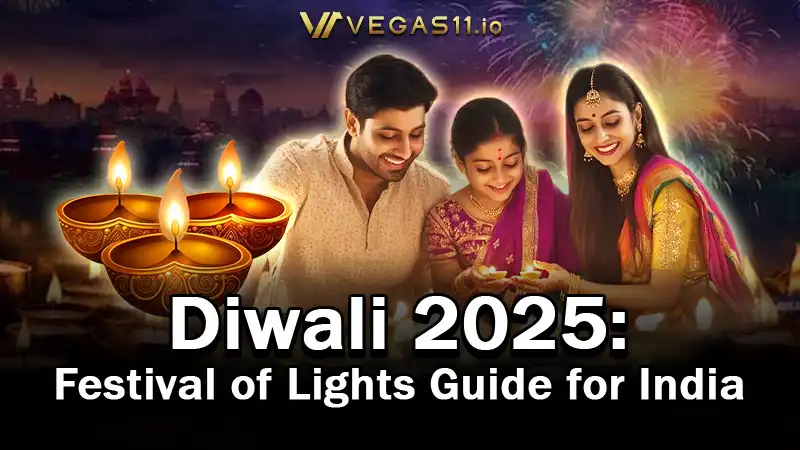
Diwali 2025: Festival of Lights Guide for India
Diwali 2025 is just around the corner, and the excitement is building across India! This year's Festival of Lights promises to be more spectacular than ever.
Whether you're planning traditional celebrations or looking for modern ways to enjoy this auspicious occasion, this comprehensive guide has everything you need to know about Diwali.
When is Diwali 2025?
Diwali 2025 falls on October 20th, marking the new moon day (Amavasya) in the Hindu month of Kartik. The five-day celebration begins with Dhanteras on October 18th and concludes with Bhai Dooj on October 22nd.
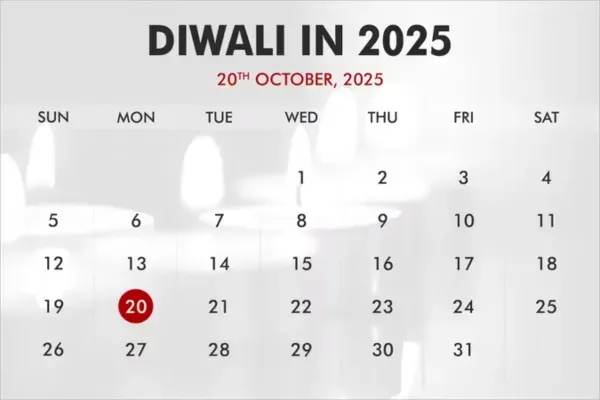
Historic Significance of Diwali
The Ancient Roots
Diwali's historic significance spans over 2,500 years, making it one of India's oldest festivals. The word "Diwali" comes from the Sanskrit term "Deepavali," meaning "row of lights."
This festival celebrates the triumph of light over darkness, good over evil, and knowledge over ignorance.
Religious and Cultural Importance
For Hindus, Diwali commemorates Lord Rama's return to Ayodhya after 14 years of exile and his victory over the demon king Ravana.
The people of Ayodhya lit oil lamps (diyas) to welcome their beloved king, establishing the tradition of illuminating homes during Diwali.
Sikhs celebrate Diwali as Bandi Chhor Divas, marking Guru Hargobind's release from prison along with 52 Hindu kings. Jains observe it as the day Lord Mahavira attained nirvana, while Buddhists in some regions celebrate it as the day Emperor Ashoka converted to Buddhism.
Legendary Stories Behind Diwali
The Ramayana Connection
The most popular Diwali story comes from the Ramayana. After Lord Rama defeated Ravana in Lanka, he returned to Ayodhya with Sita and Lakshman.
The entire kingdom celebrated by lighting earthen lamps, creating the first Diwali celebration. This 14-day journey symbolizes the victory of righteousness over evil.
Goddess Lakshmi's Blessings
Another beloved story tells of Goddess Lakshmi emerging from the ocean during Samudra Manthan (churning of the ocean). She chose Lord Vishnu as her consort, and their divine union is celebrated during Diwali.
People believe that Lakshmi visits clean, well-lit homes on Diwali night, bringing prosperity and happiness.
Read More: Lakshmi: The Divine Symbol of Wealth, Prosperity & Fortune
King Bali and Lord Vishnu
In South India, Diwali also celebrates the legend of King Bali, a generous but proud ruler. Lord Vishnu, in his Vamana avatar, humbled Bali and granted him the boon to visit his subjects annually. This story emphasizes humility and devotion.
How Diwali is Celebrated Across India
North India: Grand Celebrations
Uttar Pradesh and Bihar: The heartland of India celebrates Diwali with tremendous fervor. Homes are decorated with rangoli, diyas are lit in thousands, and families perform Lakshmi Puja. Fireworks light up the sky, and sweets like gulab jamun and barfi are shared with neighbors.
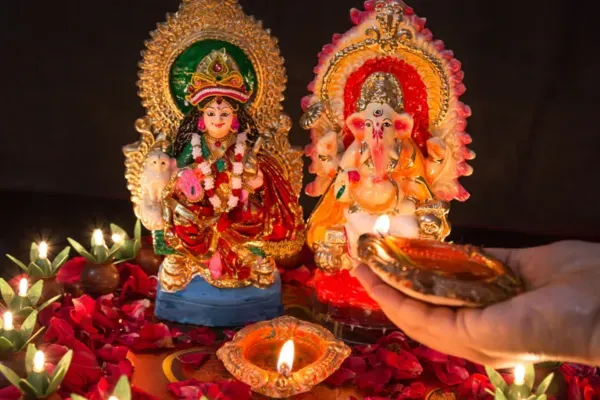
Punjab: Sikhs celebrate with special prayers at gurudwaras, followed by community feasts (langar). Golden Temple in Amritsar is illuminated with thousands of lights, creating a breathtaking spectacle.
Delhi and NCR: The capital region combines traditional celebrations with modern festivities. Markets like Chandni Chowk and Karol Bagh buzz with shoppers buying new clothes, jewelry, and gifts.
West India: Business and Prosperity
Gujarat and Rajasthan: Known for their business acumen, these states celebrate Diwali as the beginning of the new financial year. Elaborate pujas are performed for account books, and new ventures are started.
Maharashtra: Diwali spans five days here, with each day having special significance. Dhanteras, Naraka Chaturdashi, Lakshmi Puja, Govardhan Puja, and Bhai Dooj are celebrated with unique rituals.
South India: Diverse Traditions
Tamil Nadu: Diwali is called "Deepavali" and is celebrated primarily as Naraka Chaturdashi. People wake up early, apply oil, take baths, wear new clothes, and burst crackers.
Karnataka: The festival lasts for three days, with Naraka Chaturdashi being the main celebration. Homes are decorated with beautiful rangoli patterns called "rangavalli."
Andhra Pradesh and Telangana: Diwali celebrations include special prayers to Lord Krishna and Goddess Satyabhama, who are believed to have killed the demon Narakasura.
East India: Cultural Richness
West Bengal: While Durga Puja is the main festival, Diwali is celebrated as Kali Puja. Goddess Kali is worshipped with great devotion, and the celebrations have a unique Bengali flavor.
Odisha: Diwali coincides with Kali Puja here too, but the celebrations also honor ancestors with special rituals and offerings.
More festivals: Ganesha’s Guide to Good Luck: Stories, Festivals, and Miracles!
Modern Diwali Celebrations: Traditional Games Meet Digital Age
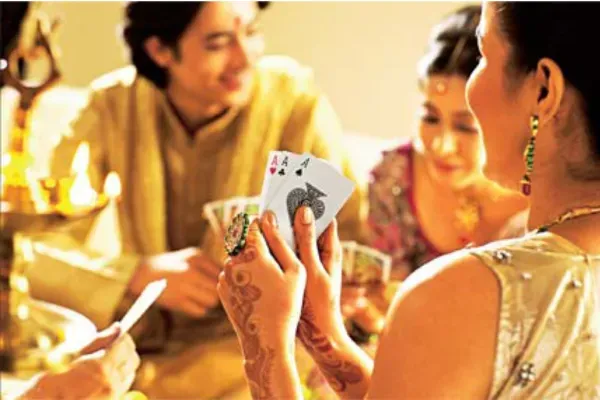
Card Games: A Diwali Tradition
Diwali nights are incomplete without the traditional card games that bring families together. Teen Patti, Poker, and Rummy have been Diwali staples for generations, creating memorable moments filled with laughter, friendly competition, and festive spirit.
Teen Patti: Known as the "Indian Poker," Teen Patti is the most popular card game during Diwali. Families gather around tables, sharing stories and enjoying the thrill of this classic game. The game's simplicity and excitement make it perfect for players of all ages.
Read More: The Ultimate Online Teen Patti Guide: How to Play & Win Like a Pro!
Why Card Games During Diwali?
Playing cards during Diwali is considered auspicious, as it's believed to bring good luck and prosperity for the coming year.
The tradition stems from the belief that Goddess Lakshmi plays dice with Lord Shiva on Diwali night, and those who stay awake and play games will be blessed with wealth.
Missing Family This Diwali? There's an App for That!
Let's be honest - not everyone can make it home for Diwali. Maybe you're stuck at work, living in another city, or your cousins are scattered across different states. But here's the thing: you can still enjoy those epic Teen Patti sessions that make Diwali nights so special!
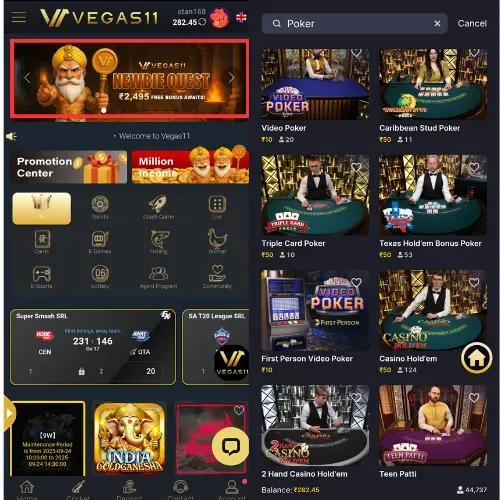
That's where Vegas11 comes in handy. It's like having your neighborhood card club right in your pocket.
While you might not always end up on the same table as your specific friends (the game matches you randomly with other players), something is exciting about meeting new people during the festival season.
You know how Diwali brings out the friendly spirit in everyone? Well, you'll find that same warmth when playing with strangers who are also celebrating the festival online.
It's perfect for those quiet Diwali evenings when you want to feel the festive card-playing vibe, even if you're celebrating solo this year.
Special Diwali Features on Vegas11:
- Festive Tournaments: Special Diwali-themed tournaments with exciting prizes
- Bonus Rewards: Extra bonuses and rewards during the festival period
- Social Gaming: Connect with players across India and celebrate together
- Safe and Secure: Play responsibly in a secure environment with fair gameplay
Diwali 2025: Preparation Guide
Shopping Essentials
- Diyas and Candles: Traditional earthen lamps and decorative candles
- Rangoli Materials: Colored powders, flower petals, and stencils
- New Clothes: Traditional wear for the family
- Sweets and Snacks: Homemade or store-bought mithai
- Gifts: For family, friends, and employees
- Crackers: Eco-friendly options preferred
- Decoration Items: Lights, garlands, and torans
Eco-Friendly Diwali Tips
- Choose clay diyas over electric lights when possible
- Opt for green crackers or avoid them entirely
- Use natural materials for rangoli
- Gift plants or eco-friendly items
- Reduce waste by sharing sweets with neighbors
Maybe you are interested in other gods: Karni Mata Temple: Rat Worship for Good Luck?
Diwali Quiz: Test Your Knowledge
🪔 Diwali 2025 Quiz 🪔
Test your knowledge about India's Festival of Lights!
Thank you for testing your Diwali knowledge! Share this quiz with your friends and family.




